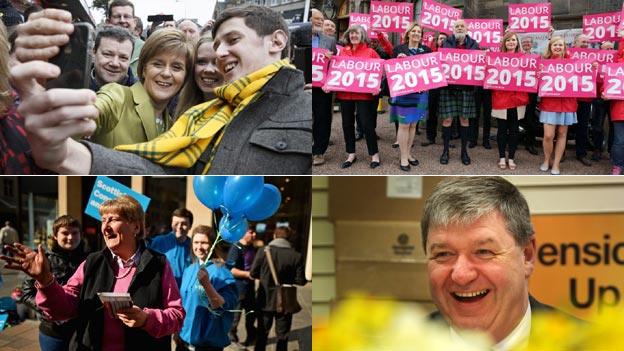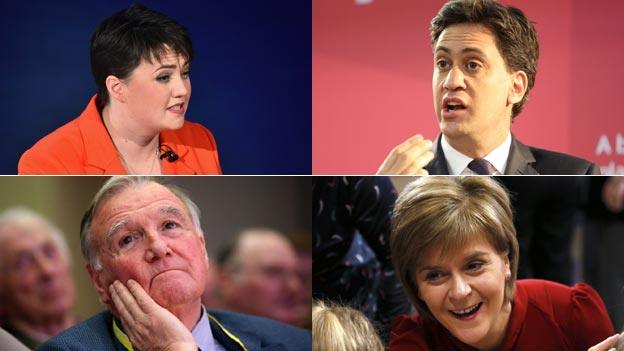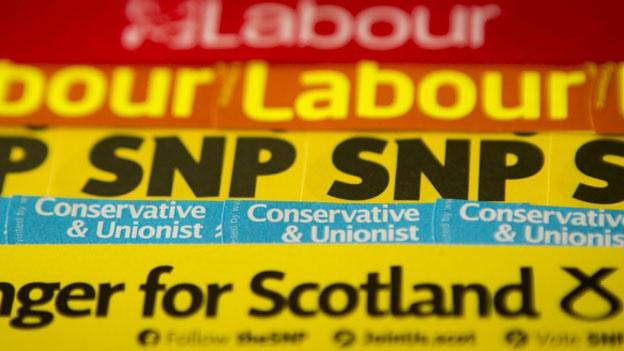Election 2015: Vive la difference
- Published

A remarkable week. A remarkable week, driven by remarkable leaders' debates, further remarkable polls - and an intriguing survey of your priorities, external for this election.
If we needed further evidence that politics in Scotland differs from the southern variety - and from the customary Westminster expectations - then this week provided that in full.
Amid all this, my attention was drawn to comments by the Electoral Reform Society. They traditionally deplore the fact that, under the First Past the Post voting system, many seats can be regarded as "safe", as lacking in competition.
For this 2015 outing, they are "confidently predicting" the outcome in 364 Westminster constituencies, more than half the total. In Scotland? They are sticking their neck out in just five seats - out of 59. Less than one tenth.
Why so? It is not, of course, that the voting system has changed in Scotland. Rather, it is the voting pattern. Polls consistently suggest that the SNP has a substantial and sustained lead. That means the ERS is reluctant to regard seats as "safe" - even when they are in areas one would formerly have classed as "heartlands" for Labour.
Financial autonomy
The SNP, in short, are being treated as the lead party. They are being treated by their opponents like the incumbents. As witness, Labour's campaign argument over the supposed impact of full fiscal autonomy.
Labour has long sought to bring the SNP's record in devolved government to the fore in this election devoted to reserved, Westminster matters. Bring it on, say SNP Ministers, who reckon they have a record to defend.
This latest move goes further. Of course, Labour has been pursuing the issue of financial autonomy for some time, most notably in questions to the first minister.
In particular, they base their argument on the figures offered by the Institute for Fiscal Studies to the effect that there would be a £7.6bn deficit for Scotland in 2015/16, had Scotland been in full charge of tax and spending. Twice, proportionately, the UK level.
The issue has developed salience, say Labour, since Nicola Sturgeon said in Wednesday's BBC Scotland debate that her party would pursue the objective of autonomy as early as next year at Westminster, perhaps in response to the tabling of a Bill seeking to legislate the Smith Commission changes.
Strong enough
Labour (and the Liberal Democrats and the Conservatives) say that would amount to significant cuts in public spending in Scotland, extending to pensions.
Nationalists say there is nothing extraordinary in Nicola Sturgeon advocating enhanced powers for Scotland. They say further that Labour's claims are misplaced: that, over a longer period, Scotland's fiscal position comfortably bears comparison with the rest of the UK; that the broader, onshore Scottish economy is strong enough to surmount the current decline in oil prices; and that fiscal autonomy would help grow that economy still further.
On pensions, we are back into exactly the territory which was to the fore in the referendum. Supporters of the Union talk of fiscal difficulties. Supporters of independence say that Scotland could afford to maintain and even enhance pension provision.
Which brings us to that poll on priorities. Among many, many other things, it suggested there was a fair degree of support for substantially enhancing Holyrood's powers up to and including an option which could be categorised as full fiscal autonomy.
- Published10 April 2015

- Published10 April 2015
